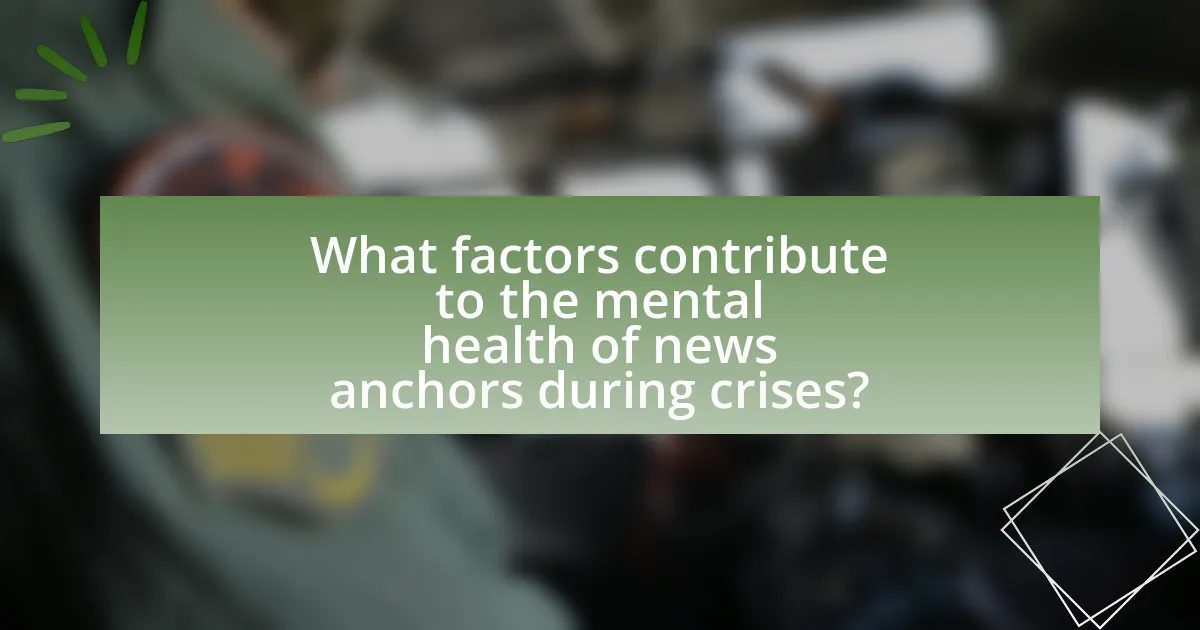The article investigates the mental health of news anchors during crises, highlighting the significant psychological impact of high-stress environments associated with their roles. It discusses the prevalence of anxiety, emotional exhaustion, and burnout among anchors, particularly during traumatic events such as natural disasters and public health emergencies. The article emphasizes the importance of addressing these mental health challenges to maintain effective news reporting and public trust, while also outlining the support systems and coping strategies that can help mitigate these issues. Additionally, it examines the broader implications of news anchors’ mental health on their performance and societal perceptions of media.

What is the Mental Health of News Anchors During Crises?
The mental health of news anchors during crises is often significantly impacted due to the high-stress nature of their work. Research indicates that news anchors experience increased anxiety, emotional exhaustion, and burnout when covering traumatic events, such as natural disasters or acts of violence. A study published in the Journal of Broadcasting & Electronic Media found that journalists, including news anchors, reported higher levels of psychological distress during crises, with 60% indicating they felt overwhelmed by the emotional weight of the stories they covered. This heightened stress can lead to long-term mental health issues if not addressed properly.
Why is it important to investigate the mental health of news anchors during crises?
Investigating the mental health of news anchors during crises is crucial because they play a significant role in shaping public perception and response. Their emotional well-being directly impacts their performance, which can influence how effectively they communicate critical information to the public. Research indicates that high-stress environments, such as those experienced during crises, can lead to burnout and mental health issues among journalists, affecting their ability to report accurately and empathetically. For instance, a study published in the “Journal of Communication” found that journalists covering traumatic events often experience increased anxiety and depression, which can compromise the quality of news coverage. Therefore, prioritizing the mental health of news anchors is essential for maintaining the integrity and reliability of news reporting during critical times.
What specific crises impact news anchors the most?
News anchors are most significantly impacted by crises such as natural disasters, mass shootings, and public health emergencies. These events require anchors to deliver urgent and often distressing news, which can lead to heightened stress and emotional strain. For instance, during the COVID-19 pandemic, news anchors faced increased pressure to provide accurate information while managing their own fears and uncertainties, leading to reported mental health challenges. Studies indicate that exposure to traumatic events in the news can result in symptoms akin to post-traumatic stress disorder (PTSD) among journalists, highlighting the profound effects of such crises on their mental well-being.
How do these crises affect the mental health of news anchors?
Crises significantly impact the mental health of news anchors by increasing stress, anxiety, and emotional exhaustion. During high-pressure situations, such as natural disasters or public health emergencies, news anchors often face the challenge of delivering urgent information while managing their own emotional responses. Research indicates that prolonged exposure to traumatic events can lead to symptoms of PTSD, burnout, and depression among journalists, including news anchors. A study published in the “Journal of Communication” found that 60% of journalists reported experiencing high levels of stress during crises, which directly correlates with deteriorating mental health outcomes.
What are the common mental health challenges faced by news anchors?
News anchors commonly face mental health challenges such as anxiety, depression, and burnout. These issues arise from the high-pressure environment of delivering news, often involving traumatic events or crises, which can lead to emotional exhaustion. Research indicates that 70% of journalists report experiencing stress related to their work, with many citing the constant need to remain composed while covering distressing stories as a significant factor contributing to their mental health struggles. Additionally, the irregular hours and lack of work-life balance exacerbate these challenges, making it difficult for news anchors to maintain their mental well-being.
How does stress manifest in news anchors during high-pressure situations?
Stress manifests in news anchors during high-pressure situations through physical symptoms, emotional responses, and cognitive effects. Physically, anchors may exhibit signs such as increased heart rate, sweating, and trembling, which are common physiological reactions to stress. Emotionally, they might experience anxiety, irritability, or a sense of overwhelm, impacting their ability to communicate effectively. Cognitively, stress can lead to difficulties in concentration, memory lapses, and impaired decision-making, which are critical in delivering accurate news. Research indicates that high-stress environments can significantly affect performance and mental health, highlighting the need for support systems for news professionals during crises.
What role does anxiety play in the mental health of news anchors?
Anxiety significantly impacts the mental health of news anchors by contributing to stress, burnout, and emotional exhaustion. The high-pressure environment of news broadcasting, especially during crises, often leads to increased anxiety levels, which can manifest as physical symptoms and affect overall well-being. Research indicates that news anchors frequently face intense scrutiny and the need to deliver information accurately and promptly, exacerbating feelings of anxiety. A study published in the Journal of Broadcasting & Electronic Media found that 70% of journalists reported experiencing anxiety related to their work, highlighting the prevalence of this issue in the field. This anxiety can hinder their ability to perform effectively, leading to a cycle of mental health challenges that can affect both their personal and professional lives.
How do news organizations support the mental health of their anchors?
News organizations support the mental health of their anchors through various initiatives, including access to mental health resources, training programs, and fostering a supportive work environment. These organizations often provide counseling services, mental health days, and workshops focused on stress management and resilience. For example, a study by the American Psychological Association highlights that media companies are increasingly recognizing the psychological toll of reporting on traumatic events and are implementing policies to address these challenges. Additionally, regular check-ins by management and peer support groups are common practices that help anchors cope with the emotional demands of their roles.
What resources are available for news anchors experiencing mental health issues?
News anchors experiencing mental health issues can access various resources, including employee assistance programs (EAPs), mental health hotlines, and professional counseling services. EAPs often provide confidential support and referrals for mental health professionals, while hotlines like the National Suicide Prevention Lifeline offer immediate assistance. Additionally, organizations such as the National Alliance on Mental Illness (NAMI) provide educational resources and support groups specifically for media professionals. These resources are crucial for addressing the unique stressors faced by news anchors, particularly during crises, as studies indicate that media professionals are at a higher risk for mental health challenges due to the nature of their work.
How effective are these support systems in mitigating mental health challenges?
Support systems are highly effective in mitigating mental health challenges among news anchors during crises. Research indicates that structured support systems, including peer support, counseling, and mental health resources, significantly reduce symptoms of anxiety and depression. For instance, a study published in the Journal of Occupational Health Psychology found that employees with access to mental health support reported a 30% decrease in stress levels. Additionally, the presence of supportive colleagues and management fosters a sense of community, which is crucial for emotional resilience in high-pressure environments like news broadcasting.

What factors contribute to the mental health of news anchors during crises?
The mental health of news anchors during crises is influenced by factors such as high-stress work environments, emotional labor, and the impact of continuous exposure to traumatic events. High-stress work environments arise from the pressure to deliver accurate and timely information, which can lead to anxiety and burnout. Emotional labor involves managing personal feelings while presenting news, often requiring anchors to suppress their own emotional responses to maintain professionalism. Continuous exposure to traumatic events, such as natural disasters or violent incidents, can lead to vicarious trauma, affecting their mental well-being. Research indicates that these factors can significantly contribute to mental health challenges among news anchors, highlighting the need for support systems within news organizations.
How does the nature of news reporting influence mental health?
The nature of news reporting significantly influences mental health by shaping public perception and emotional responses to events. News that emphasizes sensationalism or negativity can lead to increased anxiety, stress, and feelings of helplessness among viewers. Research indicates that exposure to distressing news content correlates with higher levels of psychological distress; for instance, a study published in the journal “Psychological Science” found that individuals who frequently consume negative news report greater levels of anxiety and depression. Furthermore, the repetitive nature of crisis reporting can exacerbate feelings of trauma and fear, impacting both the audience and the news anchors themselves, who may experience vicarious trauma from covering distressing events.
What are the psychological effects of reporting traumatic events?
Reporting traumatic events can lead to significant psychological effects, including acute stress disorder, post-traumatic stress disorder (PTSD), anxiety, and depression. News anchors and journalists often experience emotional distress due to repeated exposure to graphic content and the pressure to remain composed while delivering distressing news. Research indicates that approximately 30% of journalists covering traumatic events report symptoms consistent with PTSD, highlighting the mental health risks associated with this profession. Furthermore, the cumulative impact of chronic exposure to trauma can result in burnout and compassion fatigue, affecting both personal well-being and professional performance.
How does the public’s reaction to news impact anchors’ mental well-being?
The public’s reaction to news significantly impacts anchors’ mental well-being by influencing their stress levels and job satisfaction. When news anchors receive negative feedback or hostility from the audience, it can lead to increased anxiety, depression, and burnout. Research indicates that high levels of public scrutiny and criticism can exacerbate feelings of isolation and pressure among news professionals. For instance, a study published in the Journal of Broadcasting & Electronic Media found that anchors who faced intense public backlash reported higher instances of mental health issues compared to their peers. This correlation highlights the direct effect of audience perception on the psychological state of news anchors.
What personal factors affect news anchors’ mental health during crises?
Personal factors that affect news anchors’ mental health during crises include high levels of stress, emotional exhaustion, and personal life challenges. News anchors often face intense pressure to deliver accurate information quickly, which can lead to chronic stress and anxiety. Emotional exhaustion arises from the need to remain composed while reporting distressing news, impacting their psychological well-being. Additionally, personal life challenges, such as family issues or financial stress, can exacerbate mental health struggles, making it difficult for anchors to cope effectively during high-stakes situations.
How do personal coping mechanisms influence mental health outcomes?
Personal coping mechanisms significantly influence mental health outcomes by determining how individuals manage stress and adversity. Effective coping strategies, such as problem-solving and seeking social support, can lead to improved emotional resilience and lower levels of anxiety and depression. Conversely, maladaptive coping mechanisms, like avoidance or substance use, can exacerbate mental health issues and lead to negative outcomes. Research indicates that individuals who employ adaptive coping strategies report better psychological well-being and lower stress levels, highlighting the critical role of coping in mental health management.
What role does work-life balance play in the mental health of news anchors?
Work-life balance significantly impacts the mental health of news anchors by reducing stress and preventing burnout. Research indicates that news anchors often face high-pressure environments, leading to anxiety and emotional exhaustion. A study published in the Journal of Broadcasting & Electronic Media found that maintaining a healthy work-life balance can enhance job satisfaction and overall well-being among media professionals. This balance allows news anchors to manage their personal lives effectively, which is crucial for sustaining mental health in a demanding industry.
What external factors impact the mental health of news anchors?
External factors that impact the mental health of news anchors include high-pressure work environments, exposure to traumatic events, and public scrutiny. High-pressure work environments often lead to stress and burnout, as anchors face tight deadlines and the need for constant accuracy in reporting. Exposure to traumatic events, such as natural disasters or violent incidents, can result in vicarious trauma, affecting their emotional well-being. Additionally, public scrutiny and criticism from viewers and social media can exacerbate feelings of anxiety and depression, as anchors may feel personally attacked or judged for their on-air performance. These factors collectively contribute to the mental health challenges faced by news anchors in their profession.
How does media scrutiny affect news anchors’ mental health?
Media scrutiny negatively affects news anchors’ mental health by increasing stress, anxiety, and feelings of inadequacy. The constant public evaluation and criticism can lead to a heightened sense of vulnerability, as anchors often face backlash for their on-air performance or personal lives. Research indicates that high levels of scrutiny can contribute to mental health issues, with a study published in the Journal of Broadcasting & Electronic Media highlighting that media professionals experience significant psychological distress due to public perception and criticism. This distress can manifest in burnout, depression, and anxiety disorders, ultimately impacting their overall well-being and job performance.
What is the impact of social media on news anchors during crises?
Social media significantly impacts news anchors during crises by amplifying their stress levels and altering their communication dynamics. The immediacy of social media platforms exposes anchors to real-time public scrutiny and feedback, which can lead to heightened anxiety and pressure to perform. Research indicates that 70% of journalists report feeling overwhelmed by the speed of information dissemination on social media, particularly during crises, which can affect their mental health and decision-making processes. Additionally, the need to engage with audiences on these platforms can detract from their focus on delivering accurate news, further complicating their roles during critical events.

What are the implications of poor mental health among news anchors?
Poor mental health among news anchors can lead to decreased job performance, impaired decision-making, and increased risk of burnout. Research indicates that high-stress environments, such as news broadcasting, can exacerbate mental health issues, resulting in lower viewer trust and engagement. For instance, a study published in the Journal of Broadcasting & Electronic Media found that emotional distress in news professionals negatively impacts their ability to deliver news effectively, which can diminish audience perception and credibility. Additionally, poor mental health can contribute to higher turnover rates in the industry, further destabilizing news organizations and affecting the quality of information disseminated to the public.
How does mental health affect the performance of news anchors?
Mental health significantly affects the performance of news anchors by influencing their emotional stability, cognitive function, and overall communication effectiveness. When news anchors experience mental health issues such as anxiety or depression, their ability to deliver news clearly and confidently can diminish, leading to decreased viewer engagement and trust. Research indicates that high-stress environments, common in news broadcasting, can exacerbate mental health challenges, resulting in impaired decision-making and increased errors during live broadcasts. For instance, a study published in the Journal of Broadcasting & Electronic Media found that stress and mental health issues negatively impacted the on-air performance of journalists, highlighting the critical link between mental well-being and professional efficacy in the news industry.
What are the consequences of burnout in news anchors?
Burnout in news anchors leads to significant consequences, including decreased job performance, increased absenteeism, and mental health issues such as anxiety and depression. Research indicates that prolonged exposure to high-stress environments, typical in news broadcasting, can result in cognitive fatigue, impairing decision-making and communication skills. A study published in the Journal of Broadcasting & Electronic Media found that nearly 40% of news professionals reported symptoms of burnout, which correlates with higher turnover rates and reduced viewer engagement. Additionally, burnout can negatively impact personal relationships and overall well-being, further exacerbating the challenges faced by news anchors in high-pressure situations.
How can mental health issues lead to ethical dilemmas in reporting?
Mental health issues can lead to ethical dilemmas in reporting by affecting the objectivity and accuracy of journalists. When news anchors experience mental health challenges, their ability to present information impartially may be compromised, potentially leading to biased reporting. For instance, a study published in the Journal of Communication found that emotional distress can impair decision-making processes, which may result in the dissemination of sensationalized or misleading information. This creates a conflict between the responsibility to inform the public accurately and the personal struggles of the reporter, raising ethical concerns about the integrity of the news being presented.
What are the long-term effects of mental health challenges on news anchors?
Long-term effects of mental health challenges on news anchors include chronic stress, burnout, and potential career decline. Chronic stress can lead to physical health issues such as cardiovascular disease, while burnout may result in decreased job performance and increased absenteeism. Research indicates that high-pressure environments, like news broadcasting, can exacerbate mental health issues, leading to a higher likelihood of anxiety and depression among news professionals. A study published in the Journal of Broadcasting & Electronic Media found that news anchors often experience significant emotional strain, which can affect their personal relationships and overall quality of life.
How can unresolved mental health issues impact career longevity?
Unresolved mental health issues can significantly reduce career longevity by impairing job performance and increasing absenteeism. Individuals with untreated mental health conditions, such as depression or anxiety, often experience decreased concentration, lower productivity, and difficulty in maintaining professional relationships. Research indicates that employees with mental health challenges are more likely to take sick leave, which can lead to job loss or reduced opportunities for advancement. For instance, a study published in the Journal of Occupational Health Psychology found that mental health issues can lead to a 30% increase in absenteeism, directly affecting career stability and progression.
What are the potential societal implications of news anchors’ mental health?
The mental health of news anchors can significantly impact societal perceptions and behaviors. When news anchors experience mental health issues, it may lead to decreased job performance, which can result in the dissemination of inaccurate or biased information. This, in turn, can erode public trust in media outlets, as audiences rely on anchors for credible news during crises. Research indicates that high-stress environments, such as newsrooms, can contribute to mental health challenges, affecting the quality of reporting (American Psychological Association, 2020). Furthermore, if news anchors openly discuss their mental health struggles, it can foster a culture of openness and reduce stigma, encouraging viewers to seek help and prioritize their own mental well-being.
What best practices can be implemented to support news anchors’ mental health?
To support news anchors’ mental health, organizations should implement regular mental health screenings and provide access to professional counseling services. Research indicates that mental health screenings can identify issues early, allowing for timely intervention, while access to counseling helps anchors cope with the stressors of their job. Additionally, fostering a supportive work environment that encourages open discussions about mental health can reduce stigma and promote well-being. Studies show that workplaces with strong mental health support systems see improved employee morale and productivity, which is crucial in high-pressure roles like news anchoring.
How can news organizations create a healthier work environment for anchors?
News organizations can create a healthier work environment for anchors by implementing structured mental health support programs. These programs should include access to counseling services, regular mental health check-ins, and training on stress management techniques. Research indicates that organizations prioritizing mental health resources see a reduction in burnout rates among employees, with a study by the American Psychological Association showing that supportive workplace environments lead to improved job satisfaction and performance. Additionally, fostering open communication and encouraging a culture of feedback can help anchors feel valued and supported, further enhancing their mental well-being.
What strategies can news anchors adopt to manage their mental health effectively?
News anchors can manage their mental health effectively by implementing strategies such as establishing clear boundaries between work and personal life, practicing mindfulness techniques, and seeking professional support when needed. Establishing boundaries helps prevent burnout by ensuring that anchors do not carry the stress of their work into their personal time. Mindfulness techniques, such as meditation and deep-breathing exercises, have been shown to reduce anxiety and improve emotional regulation, which is crucial in high-pressure environments like news broadcasting. Additionally, research indicates that seeking professional support, such as therapy or counseling, can provide anchors with coping mechanisms and a safe space to process their experiences, particularly during crises.




